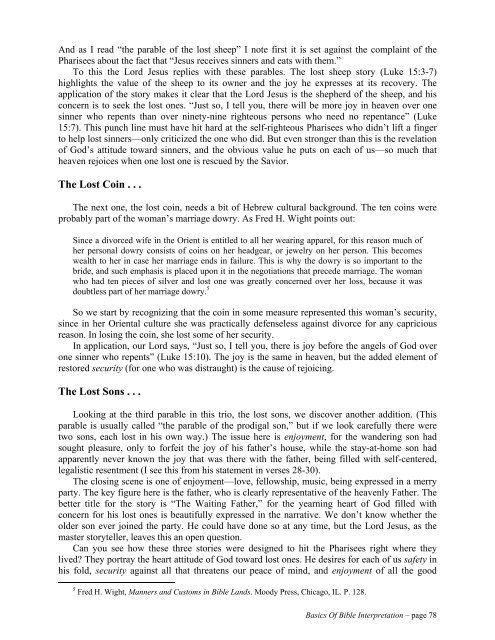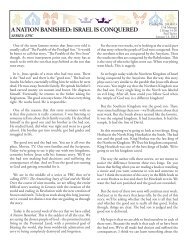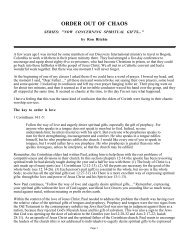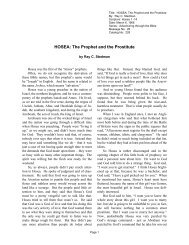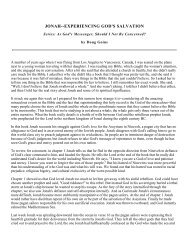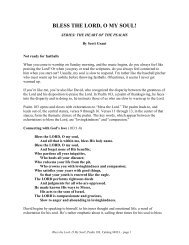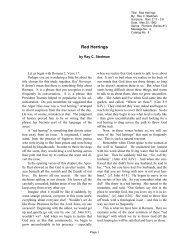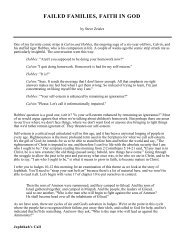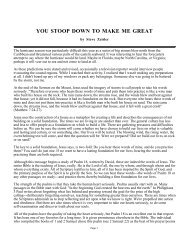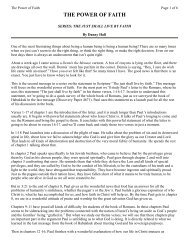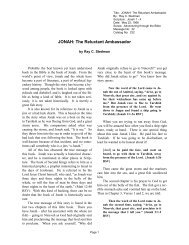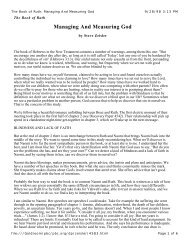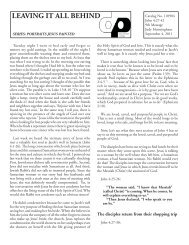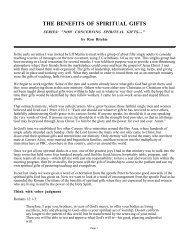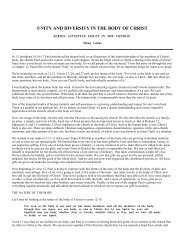Basics of Bible Interpretation - RayStedman.org
Basics of Bible Interpretation - RayStedman.org
Basics of Bible Interpretation - RayStedman.org
Create successful ePaper yourself
Turn your PDF publications into a flip-book with our unique Google optimized e-Paper software.
And as I read “the parable <strong>of</strong> the lost sheep” I note first it is set against the complaint <strong>of</strong> the<br />
Pharisees about the fact that “Jesus receives sinners and eats with them.”<br />
To this the Lord Jesus replies with these parables. The lost sheep story (Luke 15:3-7)<br />
highlights the value <strong>of</strong> the sheep to its owner and the joy he expresses at its recovery. The<br />
application <strong>of</strong> the story makes it clear that the Lord Jesus is the shepherd <strong>of</strong> the sheep, and his<br />
concern is to seek the lost ones. “Just so, I tell you, there will be more joy in heaven over one<br />
sinner who repents than over ninety-nine righteous persons who need no repentance” (Luke<br />
15:7). This punch line must have hit hard at the self-righteous Pharisees who didn’t lift a finger<br />
to help lost sinners—only criticized the one who did. But even stronger than this is the revelation<br />
<strong>of</strong> God’s attitude toward sinners, and the obvious value he puts on each <strong>of</strong> us—so much that<br />
heaven rejoices when one lost one is rescued by the Savior.<br />
The Lost Coin . . .<br />
The next one, the lost coin, needs a bit <strong>of</strong> Hebrew cultural background. The ten coins were<br />
probably part <strong>of</strong> the woman’s marriage dowry. As Fred H. Wight points out:<br />
Since a divorced wife in the Orient is entitled to all her wearing apparel, for this reason much <strong>of</strong><br />
her personal dowry consists <strong>of</strong> coins on her headgear, or jewelry on her person. This becomes<br />
wealth to her in case her marriage ends in failure. This is why the dowry is so important to the<br />
bride, and such emphasis is placed upon it in the negotiations that precede marriage. The woman<br />
who had ten pieces <strong>of</strong> silver and lost one was greatly concerned over her loss, because it was<br />
doubtless part <strong>of</strong> her marriage dowry. 5<br />
So we start by recognizing that the coin in some measure represented this woman’s security,<br />
since in her Oriental culture she was practically defenseless against divorce for any capricious<br />
reason. In losing the coin, she lost some <strong>of</strong> her security.<br />
In application, our Lord says, “Just so, I tell you, there is joy before the angels <strong>of</strong> God over<br />
one sinner who repents” (Luke 15:10). The joy is the same in heaven, but the added element <strong>of</strong><br />
restored security (for one who was distraught) is the cause <strong>of</strong> rejoicing.<br />
The Lost Sons . . .<br />
Looking at the third parable in this trio, the lost sons, we discover another addition. (This<br />
parable is usually called “the parable <strong>of</strong> the prodigal son,” but if we look carefully there were<br />
two sons, each lost in his own way.) The issue here is enjoyment, for the wandering son had<br />
sought pleasure, only to forfeit the joy <strong>of</strong> his father’s house, while the stay-at-home son had<br />
apparently never known the joy that was there with the father, being filled with self-centered,<br />
legalistic resentment (I see this from his statement in verses 28-30).<br />
The closing scene is one <strong>of</strong> enjoyment—love, fellowship, music, being expressed in a merry<br />
party. The key figure here is the father, who is clearly representative <strong>of</strong> the heavenly Father. The<br />
better title for the story is “The Waiting Father,” for the yearning heart <strong>of</strong> God filled with<br />
concern for his lost ones is beautifully expressed in the narrative. We don’t know whether the<br />
older son ever joined the party. He could have done so at any time, but the Lord Jesus, as the<br />
master storyteller, leaves this an open question.<br />
Can you see how these three stories were designed to hit the Pharisees right where they<br />
lived? They portray the heart attitude <strong>of</strong> God toward lost ones. He desires for each <strong>of</strong> us safety in<br />
his fold, security against all that threatens our peace <strong>of</strong> mind, and enjoyment <strong>of</strong> all the good<br />
5 Fred H. Wight, Manners and Customs in <strong>Bible</strong> Lands. Moody Press, Chicago, IL. P. 128.<br />
<strong>Basics</strong> Of <strong>Bible</strong> <strong>Interpretation</strong> – page 78


